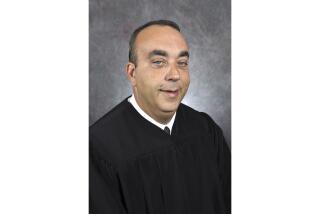R. McCullough, 64; Took Civil Rights Protest in a New Direction
Robert McCullough, who led a group of black students in a landmark 1961 civil rights protest, choosing to serve jail time on a chain gang for the crime of sitting at a whites-only lunch counter in South Carolina, has died. He was 64.
McCullough died Monday in Rock Hill, S.C., Robinson Funeral Home spokesman Samuel Reid said. He did not give a cause of death.
McCullough, along with eight other black students from Friendship Junior College, gained widespread attention when they used the “jail, no bail” technique after they were arrested in February 1961.
The protesters, who became known as the Friendship Nine, had demanded service at a McCrory’s lunch counter in Rock Hill and were charged with trespassing and breach of peace. The protest came around the first anniversary of a sit-in at another segregated lunch counter, in Greensboro, N.C., that helped galvanize the civil rights movement.
Given the option of paying a $100 fine or serving 30 days in jail, the Rock Hill students broke with earlier protesters and chose to serve the time, even though it meant an ordeal on a chain gang.
The Rock Hill group’s sacrifice “made electrifying news” within the protest movement, author Taylor Branch wrote in his book “Parting the Waters: America in the King Years 1954-63.”
“The obvious advantage of ‘jail, no bail’ was that it reversed the financial burden of protest, costing the demonstrators no cash while obligating the white authorities to pay for jail space and food,” Branch wrote.
McCullough, who was selected as the group’s leader, “did all the detail work and made sure everything was in place,” said protester David Williamson. “He was like our teacher.”
Another member of the group, Thomas “Dub” Massey, 18 at the time, said McCullough helped him recognize that what was happening at lunch counters was wrong.
“After talking to Robert, I felt like I needed to be involved and be part of the change. He said, ‘It’s not just about you, Dub. This is for all of humanity.’ ”
More to Read
Sign up for Essential California
The most important California stories and recommendations in your inbox every morning.
You may occasionally receive promotional content from the Los Angeles Times.










